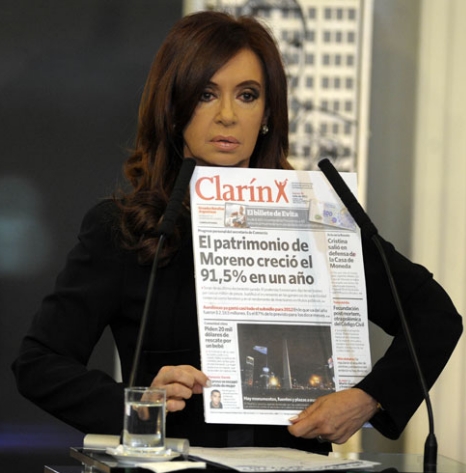|
Noble Siblings Case
The Noble siblings case is an Argentine case concerning the biological identity of Marcela and Felipe Noble Herrera, adoptive daughter and son of Ernestina Herrera de Noble, owner of Grupo Clarín. The Grandmothers of the Plaza de Mayo believe them to be children of women who disappeared during the Dirty War, and have requested samples for DNA profiling to compare with their database of victim families. Marcela and Felipe rejected the study. The administrations of both presidents Néstor and Cristina Kirchner supported a compulsory blood collection in order to carry out the DNA profiling. The opposing parties and legal precedence, on the other hand, support the Nobles right to privacy. Development Ernestina Herrera de Noble requested on May 13, 1976 in the Juvenile Court No. 1 of San Isidro, at that time in charge of Judge Ofelia Hejt, the adoption of a girl that she said she had found eleven days before in a cardboard box left at the door of his house, offering as witnesses his ... [...More Info...] [...Related Items...] OR: [Wikipedia] [Google] [Baidu] |
Ernestina Herrera De Noble
Ernestina Laura Herrera de Noble (7 June 1925 – 14 June 2017) was a prominent Argentine publisher and executive. She was the largest shareholder of the Grupo Clarín media conglomerate and director of the flagship '' Clarín'' newspaper. She was the first woman to become director of a mainstream newspaper in South America. Life and times Ernestina Laura Herrera was born in Buenos Aires in 1925. She became a Flamenco dancer and met the founding publisher of '' Clarín'', Roberto Noble, around 1950.Rosa de Cobre: Uno, como tantos otros The two maintained a sporadic relationship until Noble and his wife, Guadalupe Zapata, were divorced in the early 1960s. < ... [...More Info...] [...Related Items...] OR: [Wikipedia] [Google] [Baidu] |
Controversies Between Clarín And Kirchnerism
The Argentine Governments of Néstor Kirchner and Cristina Fernández de Kirchner had several conflicts with major media groups. Kirchner accused the Clarín Group, ''La Nación'', ''Perfil'', and related media of having promoted their overthrow. Background The president and most of her cabinet increasingly avoided press conferences and interviews with independent media, relying instead on Twitter, press statements, and public service announcements to communicate with the populace. Large media groups, particularly the Clarín Group, in turn opposed anti-trust laws enacted during her administration. Critics maintain that new legislation passed by the Congress would be selectively applied against dissenting media and journalists, while fostering a proliferation of supportive media. Supporters maintained in turn that media consolidation has become the greater threat to freedom of the press in Argentina and elsewhere in Latin America, and that measures such those abolishing media ... [...More Info...] [...Related Items...] OR: [Wikipedia] [Google] [Baidu] |
Political Scandals In Argentina
This article provides a list of political scandals that involve officials from the government or politicians of Argentina. Cadet scandal (1942) In September 1942, a sex and political scandal broke out in Buenos Aires, regarding the involvement of young cadets from the Colegio Militar de la Nación in alleged sex parties held by gay men of the upper classes. Swiftgate (1991) Swift, an American food processing company, wanted to apply for a grant to keep open its facilities in the province of Santa Fe. The presidential adviser Emir Yoma was accused of asking for a commission or kickback in exchange for facilitating the process. In December 1990, the ambassador of the United States, Terence Todman, sent a note to the Argentine government, which backed a complaint from Swift of a bribery request to "speed up" the release of tax paperwork for machinery for its plant in Rosario. As a result of the events, Yoma had to resign for asking the bribe and Antonio Erman Gonzalez left th ... [...More Info...] [...Related Items...] OR: [Wikipedia] [Google] [Baidu] |
Controversies Between Clarín And Kirchnerism
The Argentine Governments of Néstor Kirchner and Cristina Fernández de Kirchner had several conflicts with major media groups. Kirchner accused the Clarín Group, ''La Nación'', ''Perfil'', and related media of having promoted their overthrow. Background The president and most of her cabinet increasingly avoided press conferences and interviews with independent media, relying instead on Twitter, press statements, and public service announcements to communicate with the populace. Large media groups, particularly the Clarín Group, in turn opposed anti-trust laws enacted during her administration. Critics maintain that new legislation passed by the Congress would be selectively applied against dissenting media and journalists, while fostering a proliferation of supportive media. Supporters maintained in turn that media consolidation has become the greater threat to freedom of the press in Argentina and elsewhere in Latin America, and that measures such those abolishing media ... [...More Info...] [...Related Items...] OR: [Wikipedia] [Google] [Baidu] |
Aníbal Fernández
Aníbal Domingo Fernández (born January 9, 1957) is an Argentina, Argentine Justicialist Party politician, lawyer, and certified public accountant. Throughout his career, he has remained a close ally to the former President of Argentina, Presidents Néstor Kirchner and Cristina Fernández de Kirchner. Since 2021, he has served as Argentina's Ministry of Security (Argentina), Minister of Security, in the cabinet of President Alberto Fernández. He has held several cabinet positions under three presidents, serving in these offices for a total of over nine years. He served as Minister of Production under Eduardo Duhalde, as Interior Minister under Néstor Kirchner, as Ministry of Justice and Human Rights (Argentina), Minister of Justice under Cristina Fernández de Kirchner, and as the President's Cabinet Chief from 2009 to 2011. Most recently, he served as interventor of the state-owned mining company Yacimiento Carbonífero Río Turbio. He is also the President of the Confederaci� ... [...More Info...] [...Related Items...] OR: [Wikipedia] [Google] [Baidu] |
Supreme Court Of Argentina
The Supreme Court of Argentina ( es, link=no, Corte Suprema de Argentina), officially known as the Supreme Court of Justice of the Argentine Nation ( es, link=no, Corte Suprema de Justicia de la Nación Argentina, CSJN), is the highest court of law of the Argentine Republic. It was inaugurated on 15 January 1863. However, during much of the 20th century, the Court and the Argentine judicial system in general, lacked autonomy from the executive power. The Court was reformed in 2003 by the decree 222/03. The Supreme Court functions as a last resort tribunal. Its rulings cannot be appealed. It also decides on cases dealing with the interpretation of the constitution (for example, it can overturn a law passed by Congress if deems it unconstitutional). The members of the Supreme Court are appointed by the President with the agreement of at least two thirds of the present Senate members in a session convened for that purpose, and can only be removed by an impeachment process called ' ... [...More Info...] [...Related Items...] OR: [Wikipedia] [Google] [Baidu] |
Age Of Majority
The age of majority is the threshold of legal adulthood as recognized or declared in law. It is the moment when minors cease to be considered such and assume legal control over their persons, actions, and decisions, thus terminating the control and legal responsibilities of their parents or guardian over them. Most countries set the age of majority at 18, but some jurisdictions have a higher age and others lower. The word ''majority'' here refers to having greater years and being of full age as opposed to ''minority'', the state of being a minor. The law in a given jurisdiction may not actually use the term "age of majority". The term typically refers to a collection of laws bestowing the status of adulthood. Those under the age of majority are referred to as minors and may be legally denied certain privileges or rights (e.g. the right to vote, buy alcohol, marry, sign a binding contract). Age of majority should not be confused with the age of maturity, age of sexual consent, ... [...More Info...] [...Related Items...] OR: [Wikipedia] [Google] [Baidu] |
Search And Seizure
Search and seizure is a procedure used in many civil law and common law legal systems by which police or other authorities and their agents, who, suspecting that a crime has been committed, commence a search of a person's property and confiscate any relevant evidence found in connection to the crime. Some countries have certain provisions in their constitutions that provide the public with the right to be free from "unreasonable searches and seizures". This right is generally based on the premise that everyone is entitled to a reasonable right to privacy. Though specific interpretation may vary, this right can often require law enforcement to obtain a search warrant or consent of the owner before engaging in any form of search and seizure. In cases where evidence is seized in a search, that evidence might be rejected by court procedures, such as with a motion to suppress the evidence under the exclusionary rule. Italy In Italy protection from search and seizure is enshrin ... [...More Info...] [...Related Items...] OR: [Wikipedia] [Google] [Baidu] |
Right To Privacy
The right to privacy is an element of various legal traditions that intends to restrain governmental and private actions that threaten the privacy of individuals. Over 150 national constitutions mention the right to privacy. On 10 December 1948, the United Nations General Assembly adopted the Universal Declaration of Human Rights (UDHR), originally written to guarantee individual rights of everyone everywhere; while ''right to privacy'' does not appear in the document, many interpret this through Article 12, which states: "No one shall be subjected to arbitrary interference with his privacy, family, home or correspondence, nor to attacks upon his honour and reputation. Everyone has the right to the protection of the law against such interference or attacks." Since the global surveillance disclosures of 2013, initiated by ex-NSA employee Edward Snowden, the right to privacy has been a subject of international debate. Government agencies, such as the NSA, FBI, CIA, R&AW and GCH ... [...More Info...] [...Related Items...] OR: [Wikipedia] [Google] [Baidu] |
Blood Collection
In medicine, sampling is gathering of matter from the body to aid in the process of a medical diagnosis and/or evaluation of an indication for treatment, further medical tests or other procedures. In this sense, the sample is the gathered matter, and the sampling tool or sampler is the person or material to collect the sample. Sampling is a prerequisite for many medical tests, but generally not for medical history, physical examination and radiologic tests. By sampling technique *Obtaining excretions or materials that leave the body anyway, such as urine, stool, sputum, or vomitus, by direct collection as they exit. A sample of saliva can also be collected from the mouth. Excision (cutting out), a surgical method for the removal of solid or soft tissue samples. *Puncture (also called ''centesis'') followed by aspiration is the main method used for sampling of many types of tissues and body fluids. Examples are thoracocentesis to sample pleural fluid, and amniocentesis to ... [...More Info...] [...Related Items...] OR: [Wikipedia] [Google] [Baidu] |
Cristina Fernández De Kirchner
Cristina Elisabet Fernández de Kirchner (; born 19 February 1953), often referred to by her initials CFK, is an Argentine lawyer and politician who has served as the Vice President of Argentina since 2019. She also served as the President of Argentina from 2007 to 2015 and the first lady during the tenure of her husband, Néstor Kirchner. She was the second female president of Argentina (after Isabel Perón) and the first elected female president of Argentina. Ideologically, she identifies herself as a Peronist and a progressive, with her political approach called Kirchnerism.BBC News. 18 April 2006Analysis: Latin America's new left axis. Born in La Plata, Buenos Aires Province, she studied law at the University of La Plata, and moved to Patagonia with her husband Néstor Kirchner upon graduation. She was elected to the provincial legislature; her husband was elected mayor of Río Gallegos. She was elected national senator in 1995, and had a controversial tenure, while ... [...More Info...] [...Related Items...] OR: [Wikipedia] [Google] [Baidu] |





